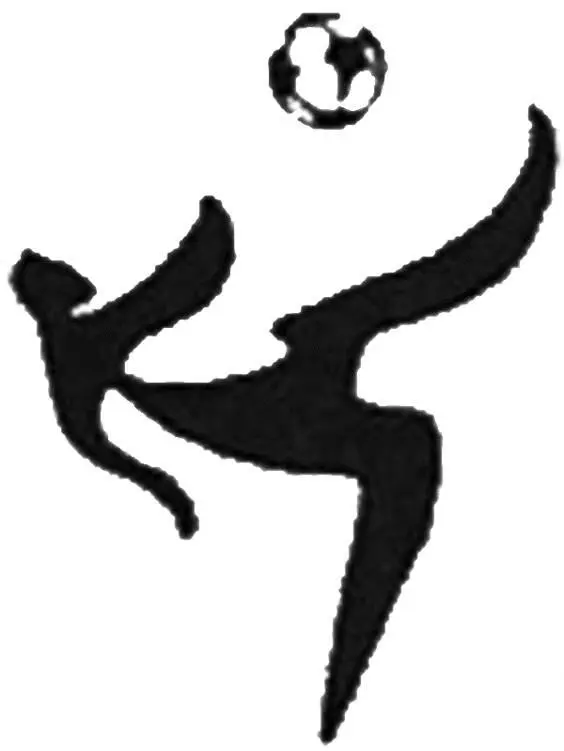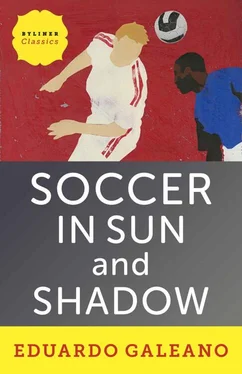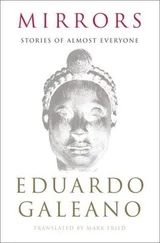Artists made way for weight lifters and Olympic runners who every once in a while kicked a ball or an opponent.
The strategy now embraced as common sense paid off: nearly everyone back, practically no one forward; the Great Wall of China defending the goal and the Lone Ranger hoping for a breakaway. Only a few years ago teams played five men forward. Now there is but one, and at this rate we’ll soon be down to none.
Argentina’s cartooning zoologist, Roberto Fontanarrosa, drew the inevitable conclusion: strikers are like pandas, an endangered species.

Iran was fast becoming the gravest threat to humankind, thanks to an international campaign declaring it might have or maybe even does have nuclear weapons, as if it had been the Iranians who dropped the bomb on civilians in Hiroshima and Nagasaki.
Ships in international waters carrying food, medicine, and toys to Palestine were being machine-gunned in one of the habitual criminal acts by which Israel punishes the Palestinians, as if they, who are Semites, were to blame for anti-Semitism and its horrors.
The International Monetary Fund, the World Bank, and numerous governments were humiliating Greece, obliging the country to accept the unacceptable, as if the Greeks, and not the bankers of Wall Street, were responsible for the worst international crisis since 1929.
The Pentagon was proclaiming joyfully that in Afghanistan its experts had discovered a trillion dollars’ worth of gold, cobalt, copper, iron, and especially lithium, the coveted essential ingredient in cell phones and laptops, as if after nearly nine years of war and thousands of deaths the invading country had finally found what it was looking for in the country it had invaded.
In Colombia a common grave was revealing more than two thousand nameless bodies which the army had thrown there as if they were guerrillas slain in combat, although people living nearby knew they were union members, community activists, and peasants defending their lands.
One of the worst ecological catastrophes of all time was turning the Gulf of Mexico into an immense puddle of oil, and a month and a half after it began, the petro-volcano at the bottom of the sea was still in full eruption and the company responsible, British Petroleum, was still whistling and looking the other way, as if it had played no part in the disaster.
In several countries, a flood of accusations of sexual abuse and child rape was inundating the Catholic Church, and traumas hitherto repressed by fear were coming to light everywhere, while certain ecclesiastical sources were defending themselves by saying that such atrocities also occurred outside the Church, as if that could excuse it, and by claiming that in many cases the priests had been provoked, as if the victims were the guilty parties.
Well-informed sources in Miami were still denying that Fidel Castro was alive and kicking, as if he weren’t giving them new cause for bitterness every day.
Two irreplaceable writers were taking their leave, José Saramago and Carlos Monsiváis, and we missed them as if we did not know they would keep returning from the dead just for the joy of tormenting the owners of the world.
And in the port of Hamburg, a multitude was celebrating the return to Germany’s first division of the St. Pauli soccer club, which, impossible as it seems, has twenty million fans under the club motto: “Say No to Racism, No to Sexism, No to Homophobia, No to Nazism.”
Meanwhile, far away from there, in South Africa, the nineteenth World Cup got under way, wrapped in one of those banners: “Say No to Racism.”
* * *
For a month the world stopped spinning and many of its inhabitants stopped breathing.
Nothing out of the ordinary, since this occurs every four years, but what was extraordinary was that this was the first World Cup held on African soil.
Black Africa, scorned, condemned to silence and oblivion, could bask in the spotlight of world attention, at least for the short while the championship lasted.
Thirty-two countries did battle in ten stadiums that cost a fortune. Nobody knows how South Africa will manage to keep those concrete behemoths running, a multi-million-dollar extravagance easy to explain but hard to justify in one of the most unjust countries in the world.
* * *
The most beautiful of the stadiums, in the shape of a flower, opened its immense petals above a bay named for Nelson Mandela.
This World Cup was a well-deserved homage to the founder of South Africa’s democracy. The fruits of Mandela’s labors can be seen in one way or another all over the globe. Nevertheless, in his country blacks are still the poorest and the most punished by police and plagues, and black were the beggars, prostitutes, and street kids who on the eve of the Cup were hidden from view to ensure that visitors did not get a bad impression.
* * *
Throughout the tournament, one could see that African soccer had conserved its agility but lost its inventiveness and daring, lots of running but little dancing. There are those who believe the managers, nearly all of them from Europe, cast a chilling effect. If true, they did scant favor for a soccer that promised so much exuberance.
Africa sacrificed its flair in the name of efficacy, and efficacy shone by its absence. Only one African country, Ghana, came to be among the eight best; and soon Ghana too was sent home. Not a single African team survived, not even the hosts.
Many African players worthy of their heritage of good soccer live and play on the continent that enslaved their ancestors.
In one of the World Cup matches, the Boateng brothers, sons of a Ghanaian father, played against each other: one in a Ghanaian shirt, the other in a German one.
Of the players on the Ghanaian side, not a one played in Ghana’s national championship.
Of the players on the German side, every single one played in Germany’s national championship.
Like Latin America, Africa exports working hands and working feet.
* * *
“Jabulani” was the name of the soapy, half-crazed tournament ball that eluded hands and flouted feet. The World Cup was obliged to embrace this novelty from Adidas, even though the players did not like it one bit. From their castle in Zurich, the owners of soccer do not propose, they impose. That’s their way.
* * *
The errors and horrors committed by certain officials made obvious what common sense has for many years demanded.
Common sense cries out, always in vain, to allow the referee to check the video replay on decisive but questionable plays. Technology now permits a consultation that is as quick and easy as a glance at that other technological instrument the referee uses to measure the length of the match. It’s called a clock.
Every other sport — basketball, tennis, baseball, swimming, even fencing and car racing — makes regular use of electronic assistance. Not soccer. And the explanation of its owners would be comical if it were not suspiciously convenient: “Mistakes are part of the game,” they say, and we are left slack-jawed at the revelation that errare humanum est .
* * *
The best save of the tournament was the work of a goal scorer, not a goalkeeper: Uruguayan striker Luis Suárez, standing on the goal line in the final minute of a decisive match, blocked the slippery ball with both hands. A goal would have taken his country out of the Cup; thanks to his act of patriotic lunacy, Suárez was sent packing but Uruguay was not.
Читать дальше













